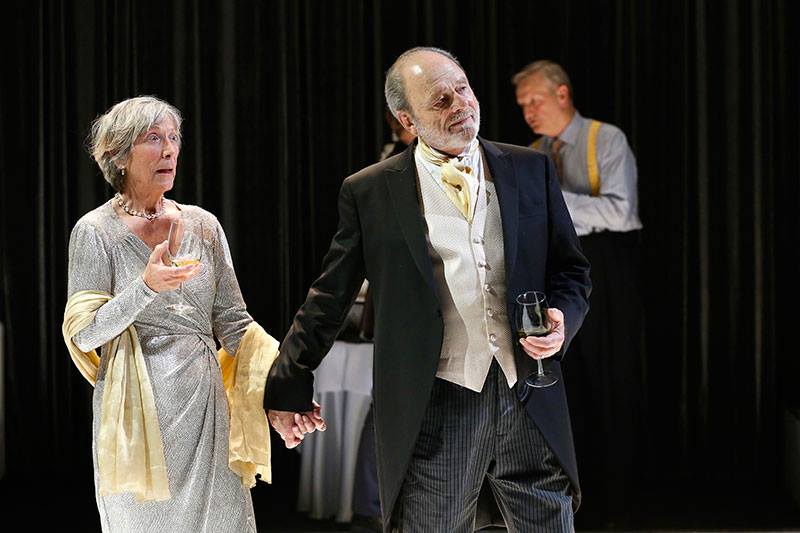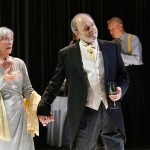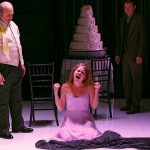Review by JK Clarke
It can be easily argued that Hamlet is Shakespeare’s most intricate and nuanced play. A director or dramaturg can peel back layer upon layer of text and still find undiscovered angles or interpretations, allowing them to explore the play in an ever so slightly new light. Such is the case with Austin Pendleton’s powerful and triumphant new production of Hamlet at Classic Stage Company (CSC) in the East Village. Propelled both by an extremely insightful interpretation as well as outstanding acting, Pendleton’s Hamlet is a sympathetic study of a world gone mad, stemming almost solely from Claudius’ pernicious and selfish act of regicide (and, adding insult to injury, fratricide and incest).
The key to any great Hamlet production is, naturally, the lead. A believable and understandable Hamlet is essential. To that end, noted film and theater actor Peter Sarsgaard fits the bill perfectly. As demonstrated in the 2003 film, Shattered Glass, in which he plays beleaguered New Republic editor Chuck Lane who has to cope with a writer’s massive tome of fabricated articles, Sarsgaard excels at playing the conflicted soul, simultaneously sympathetic, remorseful and outraged. Nothing could be better preparation for Hamlet, and Sarsgaard has him in his grips: he knows, from the outset, that something terrible is going on, something apart from the unbearable grief he’s suffering over his father’s murder and his mother’s easy transition to his uncle as her new husband.
Something, indeed, is “rotten in the state of Denmark,” as observes the officer, Marcellus (Daniel Morgan Shelley). But where this production differs is that rather than Hamlet being advised of his uncle’s evil deeds by his father’s spirit, Pendleton smartly elides the role of the Ghost. There is no otherworldly presence for the audience to see, no ghostly command swearing Hamlet’s co-conspirators to secrecy. The suggestion, instead, is that Hamlet is hallucinating (which is borne out in the text later by his mother’s inability to see the Ghost King) and his subconscious has discovered the crime. Sarsgaard plays it perfectly, muttering and holding his hands to his face—in a state of confusion and fright—throughout his descent into madness, not comprehending what is going wrong with him. It is only once he realizes that his wildest suspicions and paranoia are correct that he appears to regain his sanity. This dovetails perfectly with the other characters who are both witness to his detachment and secondary victims of the murder. Lisa Joyce’s magnificent Ophelia, with the help of Pendleton’s brilliant staging, makes more sense than ever in this production. Unlike the traditional weak-willed Ophelia who seems to crumble of her own accord, Joyce’s Ophelia is a pretty, empowered woman with agency. She hovers on stage (Walt Spangler’s modern set is whitewashed, with a round, wedding banquet table flanked by an enormous tiered and glazed cake that serves as a reminder of the just completed ceremony that has undoubtedly precipitated Hamlet’s unhinging) where she’s not normally seen, like a ghostly presence, listening to Hamlet’s interactions and soliloquies, admiring, loving and understanding him. As a result, we know they are/were happy, evenly matched lovers and we understand how she suffers through his pain alongside him. Thus, when he loses his mind, abandons her and inadvertently murders her father, she is left with nothing to live for. In this production it suddenly makes so much sense.
Another casualty of the king’s murder is Queen Gertrude, brilliantly played here by Penelope Allen as a wide-eyed, naive alcoholic who prefers to stay away from the politics. She just wants everyone to get along and for life to continue on, uncomplicated. Hamlet’s meltdown and his exposure of the scandal breaks down her walls to let the madness in, finally (after so much death around her) and her choice of the poisoned glass of wine is no accident. She knows everything is undone and she wants out. Even Claudius—an even tempered, and at times unexpectedly sympathetic Harris Yullin—sees the writing on the walls and realizes that his gambit (which he clearly expected, narcissistically, to go smoothly) has failed, and he too is ready to throw in the towel. Only aloof, sycophantic old fool Polonius (an amusing Stephen Spinella, who evokes Vincent Price at his most precious) manages to avoid the mental anguish suffered by the rest, perhaps only because of his unexpected removal from the action. Hamlet is merely the most sensitive and prescient of the bunch, and he must reveal the deed, which will only take down everyone else with him.
Pendleton and CSC’s Hamlet is not merely the story of a man who can no longer cope with a horrifying truth, but rather one who knows that the absolute necessity of revealing this truth will destroy himself and everyone he loves. He realizes early on that the tragic events we see unfold by the end of the play are foregone conclusions: “If it be not now, yet it will come: the readiness is all” he tells Horatio (Austin Jones). The complacent world as he and his friends and family knew it is gone forever, he sees, and it is this truth that tears him apart. In Pendleton’s deeply insightful interpretation, the action is hurtling toward a foregone conclusion, but the ride along the way is intense, entertaining and not to be missed.
Hamlet. Through May 10 at Classic Stage Company (136 East 13th Street between Third and Fourth Avenues). www.classicstage.org
Photos: Carol Rosegg (click all to enlarge)

























